This is a guest blog post by Derek Arnold, and was originally published on Derek’s blog Epic Insights. Derek is a 27-year-old gamer from Cleveland, OH. He is the winner of the first ever Epic Constructed World Championship Qualifier at Origins 2016.
In this article I’ll be looking at some interesting card interactions and their rules implications. Most of these interactions are highlighted here because they can help give you that slight advantage you may need to win. Some are included because they can cause some confusion even among experienced players who may not have come across them before. You’ll encounter these rules at play at a local tournament or Worlds Qualifier and should understand them if you’re looking to do well!
The People’s Champion and Vital Mission
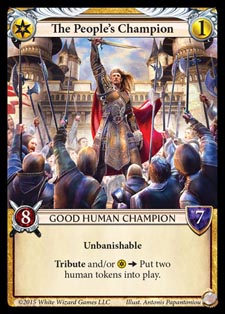
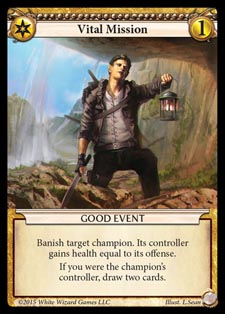
What happens when you try to banish an unbanishable champion? Exactly what you might think. The unbanishable champions says “you can’t banish me” and doesn’t get banished. So then you might ask, what would happen if I controlled The People’s Champion and targeted it with my own Vital Mission? Exactly what you might think. It doesn’t get banished, you gain health equal to its offense, draw two cards and get two human tokens out of the ally trigger. How does that sound for a bargain!?
Infernal Gatekeeper and Apocalypse
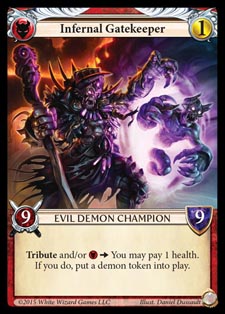

This combination illustrates an important rule that applies to many other situations and is crucial to understand. The rule is that triggered ally abilities wait to resolve until after the card that was played to trigger them is done resolving. This means that if you have Infernal Gatekeeper in play, and you play Apocalypse on your turn to break all champions, the triggered ally ability from Infernal Gatekeeper does not resolve until after Apocalypse breaks all champions. You can then pay a health to put a Demon token into play. This turns out to be a nice way to get ahead on the board because you’ve broken all champions, which normally leaves the board even, but you’re left with a Demon token in play.
Blue Dragon and Wave of Transformation
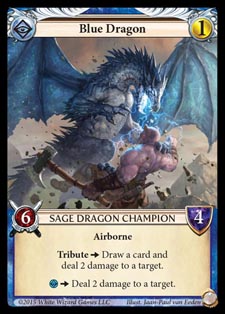
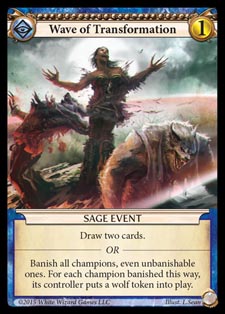
Blue Dragon’s ally ability functions in the same way as Infernal Gatekeeper. It waits to resolve until the card that triggered the ally ability is done resolving. However, it has a somewhat strange implication in combination with Wave of Transformation. The triggered ally ability from Blue Dragon can actually be used to deal two damage to a wolf token put into play with Wave of Transformation. This can feel strange because at no point are Blue Dragon and the wolf token in play at the same time.
Reaper and Soul Hunter

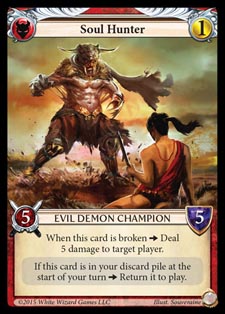
Soul Hunter is a powerful card, but can take a few turns to get going. One way to jump start Soul Hunter is to play it when you have a Reaper in play. This is yet another interaction that utilizes the rule that triggered ally abilities wait to resolve until the card that was played to trigger them resolves. When you play Soul Hunter, the ally ability from Reaper triggers, but won’t resolve until after Soul Hunter is already in play. Once Soul Hunter is in play you can target it immediately to deal five damage to a player and put a demon token into play.
Wither and Insurgency
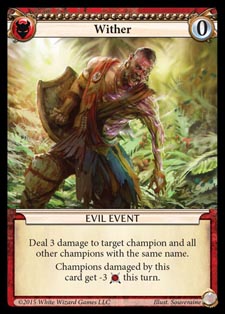
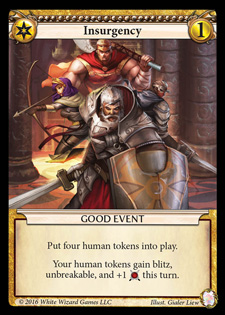
Have you ever felt hopeless in the face of an unbreakable token onslaught? Have you ever searched your hand for a way not to die immediately when facing the horde? Well, Wither is here to throw you a life saver. Even though unbreakable champions cannot be broken, they can still be dealt damage. Those human tokens may be unbreakable this turn, but they won’t be next turn and Wither can save you from taking a lot of damage.
Thought Plucker and The Gudgeon
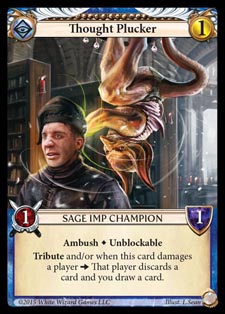
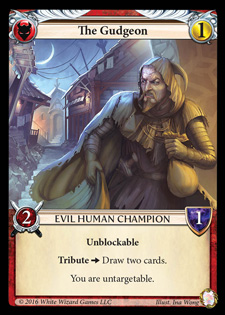
If your opponent has The Gudgeon in play and you play a Thought Plucker, your opponent will not discard a card from the triggered ability, but you will still draw a card. With the errata update on Thought Plucker, the Tribute effect now reads “Target opponent discards a card. You draw a card.” Even though your opponent is untargetable, and therefore can’t be targeted by the first part of the effect, you still continue to complete all steps as best as you can from the triggered ability and draw a card. In contrast to the Tribute ability on Thought Plucker, the triggered ability when Thought Plucker deals damage to an opponent reads “That player discards a card. You draw a card.” This ability does not target and therefore will cause an opponent with The Gudgeon in play to discard a card.
Drinker of Blood and Drinker of Blood
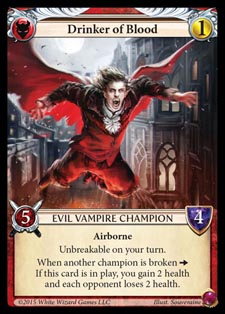

When triggered abilities happen simultaneously on both sides of the board, the active player (the player whose turn it is) resolves all of their triggers first before the other player. Additionally, if at any point a player’s health is at 0 or below, they lose the game, even if there are triggers waiting to resolve. These rules have some interesting implications. For instance, if both players have a Drinker of Blood in play, and there are enough small tokens on the board to win the game with a Flash Fire, you’d need to play Flash Fire on your turn in order to win the game. All of your Drinker of Blood triggers would happen first and your opponent would be at 0 health before they could resolve any of their own Drinker of Blood triggers. If you use Flash Fire on your opponent’s turn, the opposite would happen and you’d KO yourself.
Lesson Learned and Ancient Chant
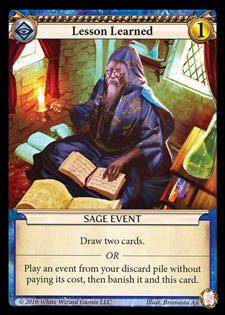
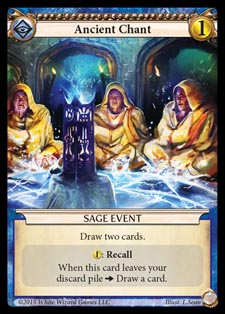
This interaction exploits the triggered ability from Ancient Chant along with the rule that event cards go to the Supplemental Zone while resolving, and then go to the Discard Pile once they’ve finished resolving. Here’s what’ll happened if you play Lesson Learned and choose the Ancient Chant in your discard pile as the card to play:
- Lesson Learned is played and goes to the Supplemental Zone while it completes its resolution.
- Ancient Chant is chosen as the card to be played without paying its cost and goes from the discard pile to the Supplemental Zone. This triggers the effect from Ancient Chant because it has left the discard pile, but the effect waits to resolve until Lesson Learned and Ancient Chant are done resolving.
- Two cards are drawn from Ancient Chant which then finishes resolving and goes back to the discard pile.
- Lesson Learned finishes resolving and banishes itself along with Ancient Chant. This triggers the effect from Ancient Chant once again because it has again, left the discard pile.
- Now that Lesson Learned and Ancient Chant are done resolving, both triggers from Ancient Chant can resolve and you end up drawing two more cards for a total of four cards!
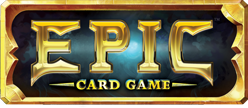
Recent Comments